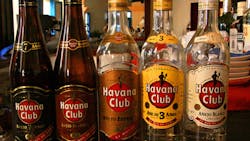Bacardi Seeks US Reversal on Cuba License to Sell Rum
MIAMI --Bacardi said on February 16 it had demanded the United States reverse its recent decision allowing Cuba to sell Havana Club rum in America when the U.S. trade embargo ends.
Bacardi, stepping up its long legal battle over trademark protection of its Havana Club rum, said it had filed the request for the U-turn with the Office of Foreign Assets Control, the Treasury's arm that enforces economic and trade sanctions.
"OFAC's decision to grant the license to the Cuban government reverses its prior decision in 2006 to deny that very same license and contradicts its own defense of that decision in various U.S. courts," said Bacardi senior vice president and general counsel Eduardo Sanchez.
"We request that OFAC revoke License 837-1 retroactively to prevent Cuba -- and its business partner Pernod Ricard -- from their continued trafficking in illegally confiscated property," Sanchez said.
The privately held, Bermuda-based Bacardi has been selling Havana Club in the U.S. since the mid-1990s.
French spirits and wine company Pernod Ricard sells its Havana Club rum in Cuba and a number of markets, notably Germany, France, Britain and Canada, but not the U.S.
The move is Bacardi's latest salvo in the legal battle that dates back to the Cuban revolution of 1959, and it comes amid thawing U.S.-Cuba diplomatic relations.
The United States and Cuba restored diplomatic relations in July 2015. In January, Cuba received a license to sell Havana Club in the United States from the US Patent and Trademark Office once the US embargo against the communist island is lifted.
Bacardi, which had made rum in Cuba under its own name and that of Havana Club, left the island in 1960 after Fidel Castro came to power.
Bacardi insists it bought the rights to Havana Club from the Arechabala family, which made the rum until its distillery was seized by the Cuban government after the revolution.
In 1976, Cuba, which also continued to produce Havana Club, was able to register the trademark in the United States. But it lost the trademark in 2006 when it could not present the necessary license to the Treasury Department.
Copyright Agence France-Presse, 2016
About the Author
Agence France-Presse
Copyright Agence France-Presse, 2002-2025. AFP text, photos, graphics and logos shall not be reproduced, published, broadcast, rewritten for broadcast or publication or redistributed directly or indirectly in any medium. AFP shall not be held liable for any delays, inaccuracies, errors or omissions in any AFP content, or for any actions taken in consequence.
